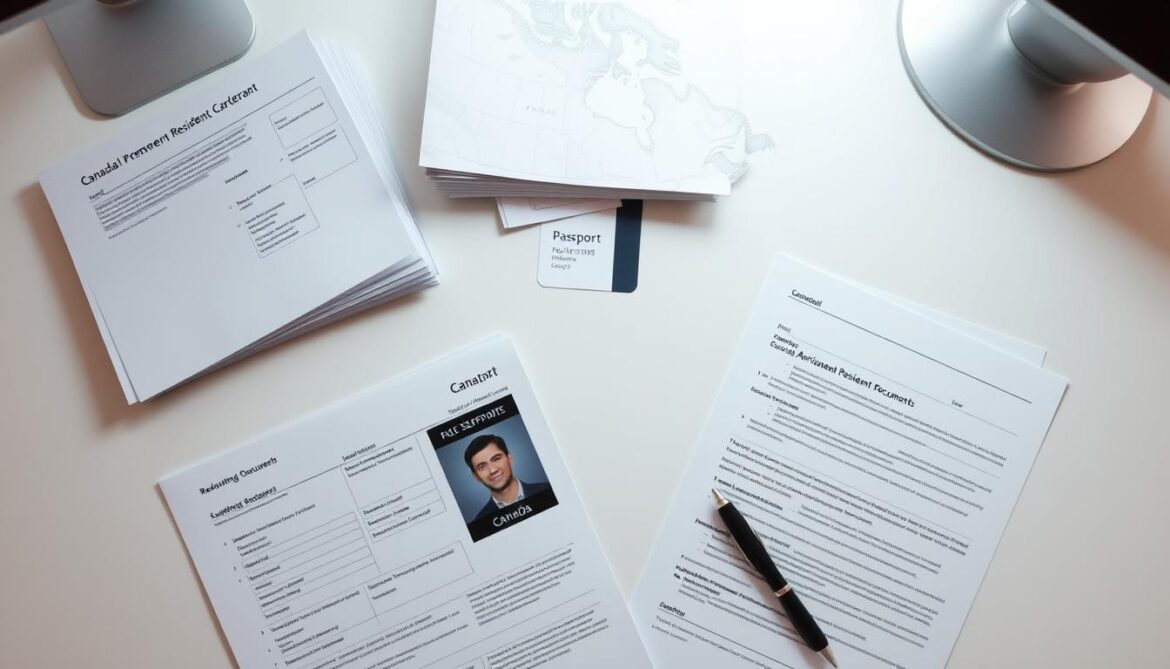Did you know 68% of applicants face unexpected delays when updating their immigration status documents? Recent data shows processing times swing wildly between 45 days and 4 months – a critical gap that could derail travel plans or job opportunities.
Maintaining valid identification remains vital for accessing healthcare, employment, and cross-border travel. Since 2025, new biometric requirements and digital submission options have streamlined parts of the process while adding fresh complexities.
You can submit requests through three main channels: online via the official immigration portal, physical mail to Nova Scotia processing centers, or select in-person service locations. The $50 fee applies universally, but processing speeds vary based on application completeness and seasonal demand.
Key Takeaways
- Three submission methods available with varying processing timelines
- Mandatory biometric updates introduced in 2025
- Six-month renewal window before expiration prevents travel issues
- Distinct requirements for first-time vs. renewal applications
- Legal safeguards protect status during processing periods
Timing proves crucial – starting the process early helps avoid last-minute complications. Special provisions exist for urgent travel needs, including temporary travel documents while awaiting your updated credentials.
Overview of the Renewal Process
Timing proves critical when updating your legal status credentials. Submitting requests through the official visa portal allows real-time tracking and reduces errors. Applications filed 6 months before expiration maintain uninterrupted access to essential services.
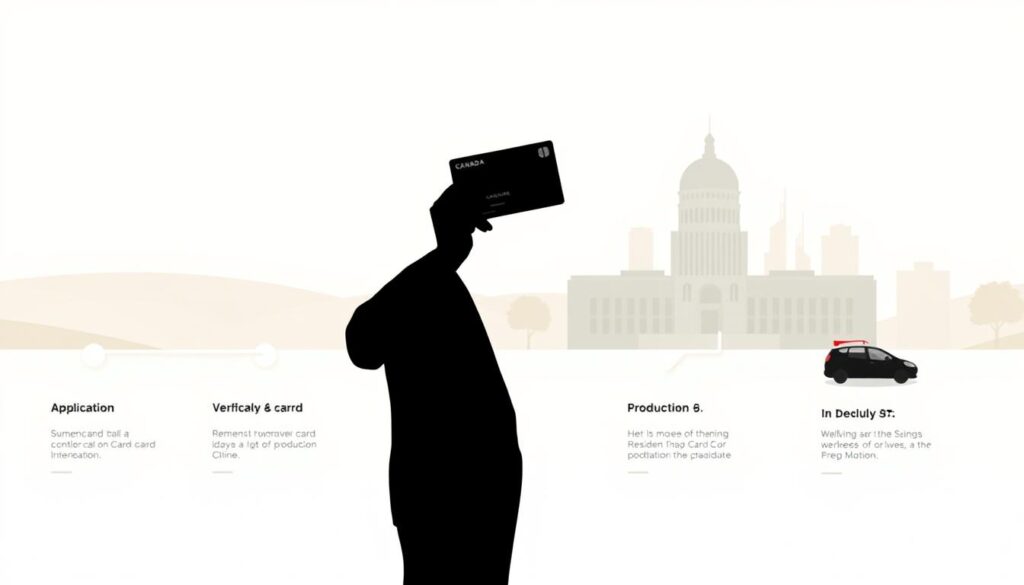
Understanding the Importance of Timely Renewal
Expired credentials create immediate travel limitations. Airline carriers require valid proof of status for boarding flights. Those needing urgent international trips must obtain special travel documents.
Current data shows:
- 63% of delayed applications involve missing residency proof
- Priority requests take 14-21 days during peak seasons
- Digital submissions reduce errors by 40% compared to paper forms
Key Benefits for Permanent Residents
Valid status protects your right to work and access universal healthcare. Renewed credentials simplify border crossings and serve as primary proof during job applications.
Maintaining updated documentation also:
- Ensures eligibility for citizenship applications
- Preserves family sponsorship privileges
- Prevents service interruptions with banks/government agencies
Use the visa portal’s notification system to monitor progress. Address discrepancies within 72 hours to avoid processing delays.
Eligibility Criteria and Residency Requirements
Understanding eligibility rules ensures smooth document updates. To qualify, you must maintain active status without citizenship and avoid removal orders. The cornerstone requirement? Being physically present in Canada for 730 days within any five-year window before applying.
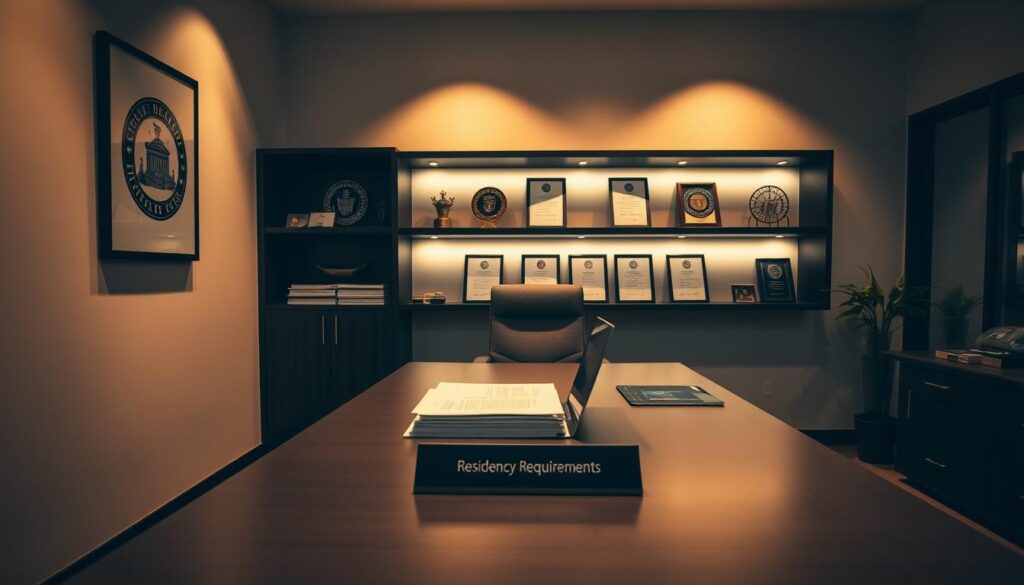
These 730 days don’t need to be consecutive. Travel abroad counts toward your total if you’re:
| Scenario | Days Counted | Documentation Needed |
|---|---|---|
| Working for Canadian employer overseas | Full duration | Employment contract |
| Accompanying citizen spouse abroad | Full duration | Marriage certificate |
| Child attending foreign school | Up to 365 days | Enrollment records |
Extended absences require valid proof. Criminal convictions or voluntary status relinquishment disqualify applicants immediately. Use the official visa portal’s calculator to track your physical presence in Canada accurately.
Special cases include diplomatic service or humanitarian work. Always keep border crossing records and lease agreements as residency evidence. Those who’ve obtained citizenship through naturalization become ineligible – check your status annually through government portals.
Preparing Your Application and Required Documents
Missing a single form could delay your status confirmation by months. Start by downloading the latest IMM 5444 form directly from the official visa portal – the only source guaranteeing up-to-date requirements. Recent updates show 42% of rejected submissions use outdated forms from third-party sites.
Essential Components for Submission
Your package needs two identical photos meeting strict specifications. Measure 50×70 mm with plain white backgrounds – no shadows or filters allowed. Sign both copies on the back using permanent ink.
Follow this checklist to avoid common pitfalls:
| Document Type | Examples | Purpose |
|---|---|---|
| Financial Records | Tax returns, bank statements | Shows economic ties |
| Residency Proof | Leases, health records | Confirms physical presence |
| Employment Evidence | Pay stubs, contracts | Verifies work history |
Building a Strong Evidence File
Self-employed individuals need business licenses and client invoices. For travel gaps, provide boarding passes or visa stamps. Translate foreign papers through certified services and notarize copies.
Can’t find primary documents? Use sworn affidavits explaining missing items alongside secondary proof like utility bills. Organize materials chronologically in labeled folders for faster processing.
Detailed Step-by-Step Application Process
Navigating the submission process requires precision and attention to detail. The official immigration portal offers integrated tools to guide you through each phase while maintaining real-time updates.
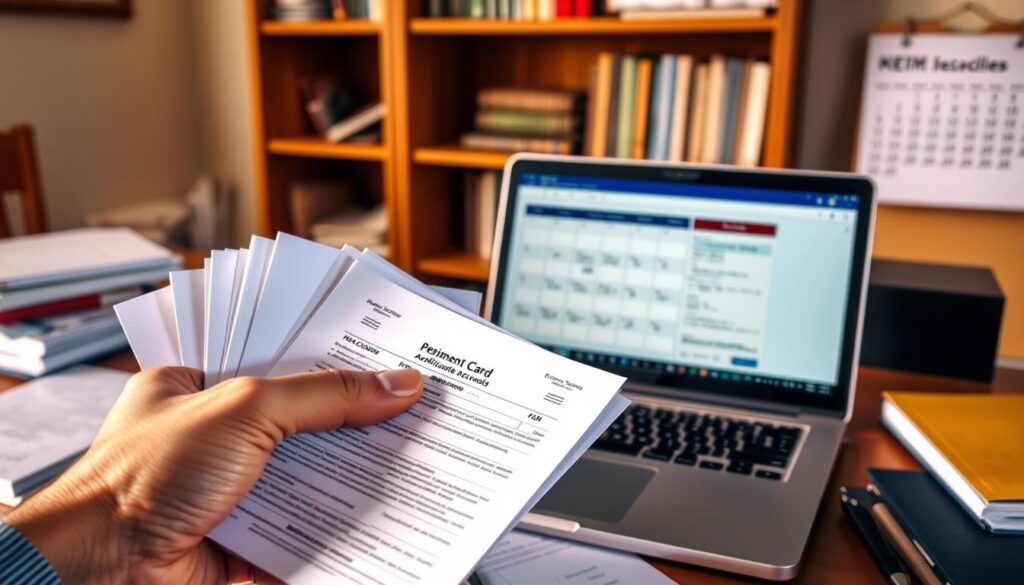
Filling Out the IMM 5444 Form
Download the latest form directly from the government portal to avoid outdated templates. Complete all fields using block letters – electronic signatures aren’t accepted for mailed submissions. Pay special attention to travel history sections, listing every border crossing within the eligibility period.
Double-check these critical elements before submission:
- Consistent name spelling across all documents
- Accurate entry/exit dates matching passport stamps
- Current contact information including secondary email
Submitting Your Application Online or By Mail
Digital submissions through the portal provide instant confirmation and progress tracking. Prepare scanned documents in PDF format under 4MB each. Use high-resolution scans showing full page edges for photos and signatures.
For mailed packages:
- Use trackable courier services with signature confirmation
- Include a detailed contents list on top
- Protect photos in rigid envelopes to prevent bending
The portal automatically generates a submission receipt upon successful upload. Mail applicants should request postal tracking numbers as proof of delivery. Address discrepancies within 48 hours through the case-specific enquiry form.
Calculating Your Physical Presence in Canada
Accurate time tracking separates successful applications from delayed ones. Start by using the official visa portal’s interactive calculator to automatically tally your eligible days. This tool cross-references your travel history with entry/exit records for precision.

Your 730-day requirement counts every midnight spent within borders during the five-year window. Partial days abroad don’t subtract from your total – only full 24-hour periods outside the country affect the calculation.
| Travel Scenario | Counted Days | Proof Required |
|---|---|---|
| Same-day border crossings | 0 | Receipts with timestamps |
| International layovers under 24h | Full day | Boarding passes |
| Overseas work assignments | Variable | Employer letters |
Compile travel dates using passport stamps and credit card statements. For gaps in traditional records, submit alternative evidence like:
- Library membership usage logs
- Public transit monthly passes
- Prescription refill histories
Applicants often make two critical errors: counting partial travel days as full absences, and miscalculating the five-year window’s start date. Double-check your math using the portal’s verification feature before submitting.
Remember – your assessment period rolls forward daily. The calculator date determines which trips get included. Update your records quarterly to maintain accurate counts for future applications.
Biometrics and Additional Supporting Documents
New security measures now require most applicants to submit biometric data starting in 2025. This change helps verify identities faster while reducing fraud risks. You’ll receive scheduling instructions through the immigration portal within 3 business days after submitting your application.
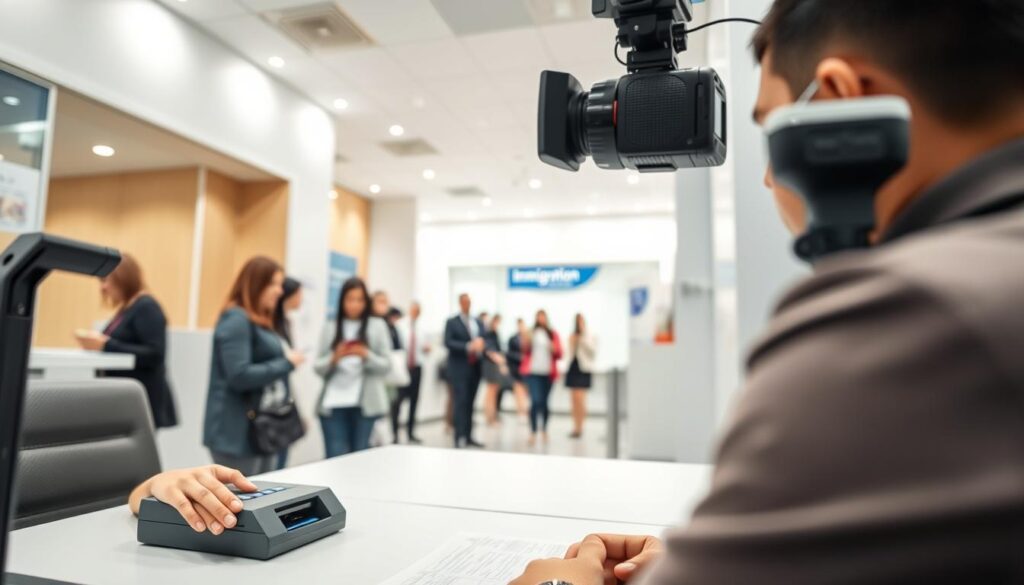
Booking Your Biometrics Appointment
Use the portal’s integrated scheduler to pick a date at one of 87 collection centers nationwide. Bring these items to your appointment:
- Original passport or travel document
- Appointment confirmation letter
- Completed IMM 5644 checklist
Same-day bookings aren’t available – schedule at least 14 days in advance during peak seasons.
Verifying Your Identity and Documentation
Technicians will capture fingerprints and a neutral-expression photo during your 20-minute visit. Some applicants need extra verification steps like:
| Situation | Additional Proof | Format |
|---|---|---|
| Name changes | Legal amendment papers | Certified copies |
| Address history gaps | Utility bills | Dated PDFs |
Your biometric data remains valid for 10 years – future applications won’t require repeats unless specifications change. Combined with document checks, this system confirms eligibility while speeding up processing by 33% compared to older methods.
Understanding the Fees and Processing Times
Balancing costs and timelines proves crucial for smooth credential updates. The standard $50 processing fee remains unchanged since 2023, payable exclusively through IRCC’s secure payment gateway. After completing your transaction, upload the digital receipt directly through the status portal’s payment section.
Processing Fee Details and Payment Methods
Your payment confirmation serves as essential proof – keep both digital and printed copies. Three payment options exist for most applicants:
- Credit/debit cards through the government portal
- Prepaid Visa/Mastercard from Canadian banks
- Interac Online for direct account transfers
Biometric collection charges apply separately if required. Never send physical cash or personal checks – these payment methods face immediate rejection.
Managing Expected Processing Times
Current completion windows range from 45 days to four months based on these factors:
| Speed Boosters | Delay Risks | Timeline Impact |
|---|---|---|
| Pre-scheduled biometrics | Missing signatures | +14 days |
| Digital submission | Postal strikes | +30 days |
| Complete documentation | Address changes | +21 days |
Track progress through the portal’s status tracker using your unique reference number. November-January submissions typically take 18% longer due to holiday closures. Fees become non-refundable once officers begin reviewing your file – even if complications arise later.
Renewal Process for Applicants Outside Canada
Living abroad temporarily doesn’t erase your status, but re-entry requires careful preparation. Those without valid credentials must obtain a travel document through international visa offices before returning. This authorization confirms your ongoing eligibility while protecting your legal standing.
Start your request through the government portal, which routes applications to the nearest processing center. You’ll need:
- Proof of fulfilled residency obligations
- Valid passport with entry stamps
- Payment confirmation for the $75 processing fee
Navigating Cross-Border Requirements
Standard renewal applications pause when you leave the country. The table below shows key differences between domestic and overseas processes:
| Factor | Standard Renewal | Overseas Process |
|---|---|---|
| Processing Time | 45-120 days | 3-6 weeks |
| Submission Method | Online/mail | Visa office only |
| Required Proof | Residency records | Return travel plans |
Land border crossings allow alternative documentation like expired credentials with government-issued photo ID. Air travelers must present valid authorization – airlines face fines for boarding passengers without proper proof.
Urgent cases can request expedited processing through the portal’s emergency channel. Update your contact information monthly to receive status alerts while overseas. Delays often occur when applicants forget to:
- Notify visa offices about address changes
- Include translated foreign documents
- Account for holiday closures abroad
canada permanent resident card renewal Tips & Best Practices
Securing your updated credentials demands smart preparation paired with digital tools. Begin by creating a three-month buffer before expiration dates – this accounts for seasonal delays and verification checks. The official portal’s document scanner helps spot missing signatures or blurry photos instantly.
Organize materials using the platform’s digital checklist. Save backups in cloud storage and label files clearly. Track application progress through automated alerts – immediate action on requests for additional proof prevents weeks-long stalls.
For postal submissions, choose couriers offering real-time tracking and delivery confirmation. Update your contact details in the portal within 24 hours of any address change. Those needing urgent travel should request temporary documents through the emergency channel.
Master these tactics to transform a complex process into a structured routine. Your proactive approach ensures continuous access to essential services while maintaining compliance with evolving regulations.


